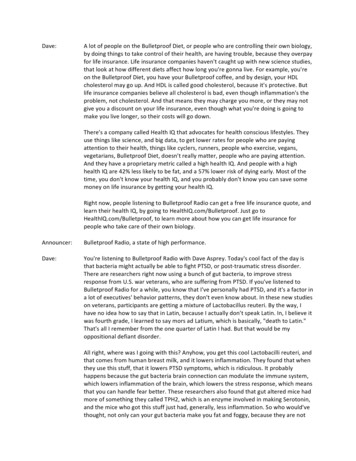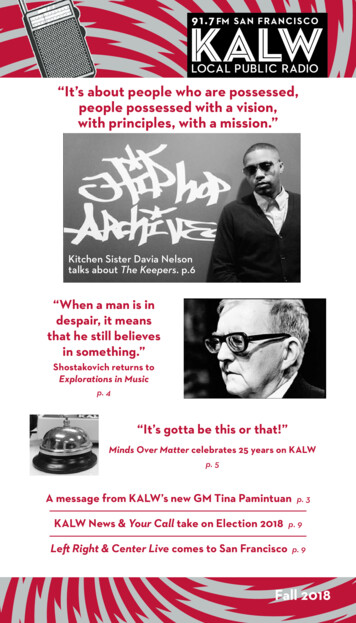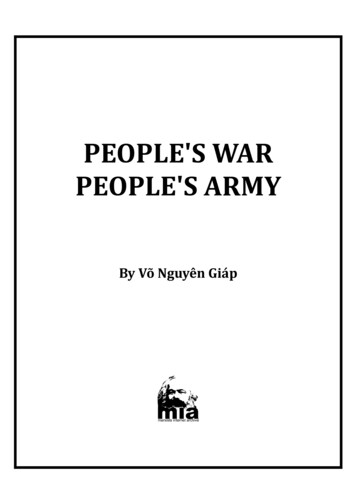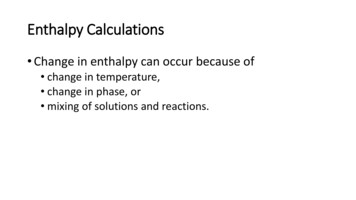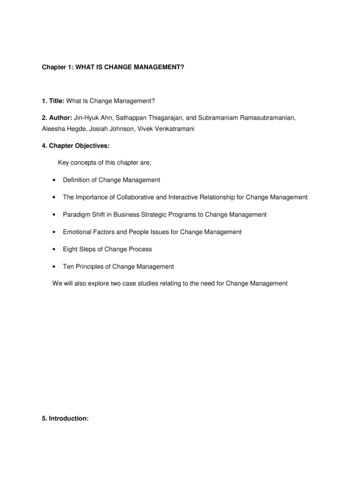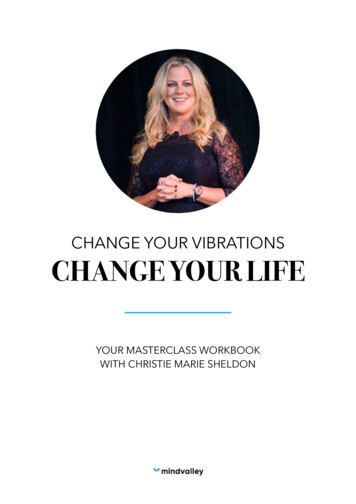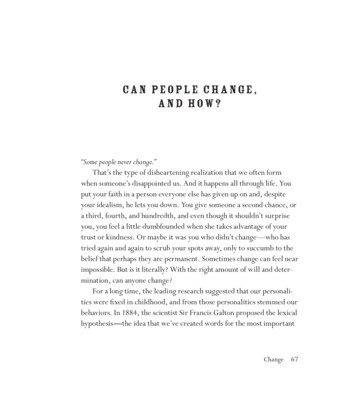
Transcription
Ca n p eopl e c h a nge ,a n d how?“Some people never change.”That’s the type of disheartening realization that we often formwhen someone’s disappointed us. And it happens all through life. Youput your faith in a person everyone else has given up on and, despiteyour idealism, he lets you down. You give someone a second chance, ora third, fourth, and hundredth, and even though it shouldn’t surpriseyou, you feel a little dumbfounded when she takes advantage of yourtrust or kindness. Or maybe it was you who didn’t change—who hastried again and again to scrub your spots away, only to succumb to thebelief that perhaps they are permanent. Sometimes change can feel nearimpossible. But is it literally? With the right amount of will and determination, can anyone change?For a long time, the leading research suggested that our personalities were fixed in childhood, and from those personalities stemmed ourbehaviors. In 1884, the scientist Sir Francis Galton proposed the lexicalhypothesis—the idea that we’ve created words for the most importantChange 67TinyBuddha.indd 6710/11/11 1:01:33 PM
and socially significant personality differences between us. In 1936,Gordon Allport and H. S. Odbert identified nearly eighteen thousand personality-describing words, which have been narrowed downthrough time and further investigation into the Big Five, as these arereferred to: openness to experience, agreeableness, conscientiousness,neuroticism, and extraversion. These evolved from extensive researchinto personality and language.We all possess all of these attributes to some degree, but we rank indifferent percentiles. No one is completely neurotic or, on the flip side,100 percent emotionally stable. No one is a total extravert or introvert.The newest research suggests that our personalities aren’t ever set instone, but rather evolve and mature over time. We are never stagnant,and if we allow ourselves, we can learn and grow all through our lives.While some employers still rely on personality testing to gauge oursuitability for jobs, the good news is that we don’t ever have to pigeonhole ourselves into specific, defined ways of being. We don’t have tobelieve that we are powerless to change things about our personalities. It might be uncomfortable to learn new tricks, but it is possible.Whether or not we actually learn them is largely dependent on whatwe believe.For a long time I lived with two conflicting beliefs that, had I keptthem, would have ensured I could never change what I did, how I felt,or how I experienced the world. I can trace their roots back to whenI started running, in late 2001, after I had decided the only way toeclipse my emotional pain was to physically escape it.68 Tiny Buddha: Simple Wisdom for Life’s Hard QuestionsTinyBuddha.indd 6810/11/11 1:01:33 PM
Before my time in NYC, I moved from Massachusetts to Washington State to live with a stranger I met on the Internet. I figured the bestway to overcome my misery was to get far away fast from the scene ofmy adolescent crimes—my self-imposed isolation and everything I didto numb myself. Six months later, I crossed the country on an Amtraktrain, disappointed that a relationship built on a foundation about asstrong as a house of cards hadn’t saved me from myself.It wasn’t until after I’d toured the United States for six monthswith marketing companies that I decided to transplant myself to thecity where dreams come true. I believed my greatest strength was mycourage—that I was willing to take massive risks and change homesand jobs in a heartbeat. What underlay that need for change was a farless romantic belief: that my only hope of happiness was to somehowoutrun myself. I would never have guessed that constant movement canbe paralyzing, but that’s exactly what I learned in New York City.It wasn’t until I was curled up in the fetal position in my fifth-floorfilth, shortly after my aspiring entrepreneur “friends” Rich and Jim left,that I began considering that my misfortune might be a gift. Later, as Isat at my window chain-smoking, swigging whiskey, and staring downat the throng of other suburban transplants I was afraid might not likeme, I realized no one could possibly like me less than I liked myself. Iwas in the perfect position to implement change.I had no one to distract me from the root of my disillusionmentwith myself. No one was going to hand me a permission slip to waitit out. No one was about to cast me to live permanently in someoneChange 69TinyBuddha.indd 6910/11/11 1:01:33 PM
else’s vision. It didn’t matter where I lived; it would always be aprison if I didn’t learn to be part of the world. It didn’t matter howmuch money I made; it would just buy me more pairs of high heelsthat looked ridiculous under my underachieving, bug-infested bed. Itdidn’t matter if I had a job I loved; it would just be a bigger distractionfrom the truth that I didn’t love myself. Right then, in a completelyimperfect world, the time was perfect to work on myself. I had onlyone choice: choose something to do with my life and muster the courage to start.A week later, I signed up to volunteer at a yoga studio in exchangefor free classes. I’d taken a few classes before, and I remembered experiencing two powerful things: a deep sense of inner calm as my slowedbreathing decelerated my thoughts and agonizing discomfort as theteacher pushed my legs deeper into a hip-opening pose. I wanted moreof both the peace and the pain—the former, because it felt good, andthe latter because I wanted to do better at getting through the inevitable moments when life wouldn’t.Every night at 6:00, without fail, I grabbed my yoga mat fromunder my raised twin-size bed and walked the three streets to the studio. No matter how I felt during the day, no matter what I had accomplished, or hadn’t, I made my way back to my mat.During my time staffing the front of the studio, I got the opportunity to learn a lot about the owner. She told me she’d smoked foralmost a decade and was slowly healing herself. I wasn’t quite thereyet. More times than I care to admit, I stood on the corner of Thirty-70 Tiny Buddha: Simple Wisdom for Life’s Hard QuestionsTinyBuddha.indd 7010/11/11 1:01:33 PM
seventh and Eighth clutching my yoga mat in one hand and a cigarettein another, imagining the wafting smoke branded me the world’s biggest hypocrite. I couldn’t just be proud of taking a positive step; I hadto berate myself for not leaping over the massive chasm between who Iwas and who I wanted to be.At the end of every yoga class, everyone does one final poseknown as savasana. It’s when you let your body absorb the effectsof the class by lying in stillness for a few moments on your mat.Something about being all sweaty and exposed, closing my eyes, andrelaxing in a room of other people made me feel a little like vomiting. At the end of most classes, I tiptoed out of the room while otherstudents were melting into a blissful state of openness and peace. Butone night, about two months in, I challenged myself to stay. At firstmy body opposed this plan. My arms and legs jittered and my teethchattered while I felt an overall magnetic pull toward the door. Evenafter a class of moving meditation, I wanted to get back to my cave.I told myself that I could fight it all I wanted but I wouldn’t be getting up for three minutes and that, if I chose to, I might even enjoyit. Miraculously, it worked. I don’t know that I’d ever experienceda state of calm being with so little resistance, at least not while leftalone inside my own head.After class, I felt completely unburdened by my usual angst, fear,and containment. I even complimented one woman on her multicolored yoga bag. I told another woman her practice inspired me. Andthen I said yes when she asked me to grab a bite to eat.Change 71TinyBuddha.indd 7110/11/11 1:01:33 PM
I instantly regretted it. She might not be as friendly outside thestudio. I might want to leave but feel trapped in conversation with her.And worst of all, I wouldn’t be able to smoke for at least another hour.As we walked to the sandwich place down the street, I fidgeted withmy hair and bit my nails, trying to satisfy the nervous energy that wasscreaming at me to run home and stuff five Marlboros into my mouthto make up for lost time.I would like to say I remember even one single thing she said, butto this day I have no idea. All I know is that she did speak words, andphysically I was capable of hearing and understanding them, but mythoughts were way too loud to allow it. All the openness I created inclass filled up with a swarm of anxieties and fears, but I’d passed thepoint of no return; the only option was to get through this meal. I’dpush through it, like I pushed through so many other uncomfortablemoments, and then run back to safety as soon as I could. It could belike it never happened. I’d be alone soon enough.At some point during my inner diatribe, my cigarette pack fell outof my pocket. Maybe I was willing it out with my mind. Or maybe itwasn’t my friend after all. Maybe my habit was trying to sabotage thisnew relationship, which would clearly have been deep and fulfillinghad I not just proven myself a poser—and not the yoga kind. Whateverthe case, I was outed. I was not what I seemed. I was a fraud. I hadn’tchanged at all. I was weak and intrinsically bad.I take back what I wrote earlier. I will never forget one thing myclassmate said when she saw the pack and then heard my confession of72 Tiny Buddha: Simple Wisdom for Life’s Hard QuestionsTinyBuddha.indd 7210/11/11 1:01:33 PM
meaning to quit: “Good for you, honey. It can be so hard. Keep comingback to class. You’ll get there.”This woman who hardly knew me, whom I’d been secretly plotting to desert, was unconditionally compassionate and kind to me.She didn’t focus on what I was doing wrong; she didn’t hone in on myinability to instantaneously transform my life into the picture of healthand happiness. She didn’t judge me for being flawed or form generalassumptions about who I was based on my challenges. Instead she recognized that I’d made a positive choice and that, if I kept at it, I couldchange over time. She saw me as a complete package—the sum of mystrengths and my weaknesses. I was not someone to be ashamed of; Iwas someone to be proud of. There was nothing wrong with me. Mychoices could use improvement, and I was working on that. I was nota weak person; I just gave in to weakness sometimes. I was not a badperson; I just made bad choices sometimes. Regardless of all of that, Ideserved understanding. I was not someone to escape; I was someoneto love.The very act of making a different choice is in itselfchange.We are all people worth loving, regardless of what behaviors wemay want to change—and we all have the power to change, even if onsome days our resistance feels about as overpowering as a riptide. Wemay not always open ourselves up to new possibilities, but that doesn’tChange 73TinyBuddha.indd 7310/11/11 1:01:33 PM
mean we’re unable. We may have days when we’re not very friendly orcompassionate, but that doesn’t mean we have to experience every dayguarded and closed off. We might experience high levels of stress andinsecurity, but that doesn’t imply we’ll always experience the worldwith a sense of worry and fear. On any given day, we can change theway we act and interact with other people. The very act of makinga different choice is in itself change. Whether or not we can sustainthose changes depends largely on what we believe and what we tellourselves.Most people are far more compassionate and patient with otherpeople than they are with themselves. You’d probably never tellyour friend that she’s worthless if she was having trouble changingher eating habits. You likely wouldn’t berate your mother for feeling too scared to go out and meet new people. And yet you formoverarching conclusions about yourself and your character based onyour own shortcomings and setbacks. We expect immediate resultsand get frustrated and disappointed when we don’t feel like we’remaking progress fast enough. If change isn’t instantaneous—if wecan’t recognize it through considerable alterations to the world aswe know it—we assume it isn’t happening. That feeling of resignation is precisely what keeps us stuck, or perhaps more accurately,feeling stuck.We can get unstuck at any time—that much is clear. What can beslightly more confusing is how. With that in mind, I asked on Twitter,“Can people change, and how?”74 Tiny Buddha: Simple Wisdom for Life’s Hard QuestionsTinyBuddha.indd 7410/11/11 1:01:33 PM
Change starts in our mindPeople can change when they realize that the pleasure of changing is greaterthan the pain of staying the same. @AdamHansenOne of the reasons people change is because they educate themselves. @Queen Isis 24People can and will change by realizing the difference between what theythink and who they are and acting on it. @MrWaffleableChange happens when we stop identifying with our ideas, opinions, concepts, beliefs, and judgments. @mullet3000People change as soon as they try to see themselves from a different angle. @skaterearthSince the advent of the personal-development industry, we’ve becomeincreasingly determined to improve ourselves. In 2007, the National Post(Canada) referred to professional coaching as the second-fastest-growingcareer in the United States. Though this form of coaching is primarilygeared toward achieving professional success, it involves identifying andchallenging fears, attitudes, and thoughts that inhibit growth. We all havethem, and sometimes we’re so determined to see outward change thatwe skip the vital step of evaluating the beliefs that stand in the way.Change 75TinyBuddha.indd 7510/11/11 1:01:33 PM
Henry Ford said, “Whether you think you can or you can’t, you’reright.” The same is true for change: if you don’t believe you can, youcan’t. We form beliefs all throughout our lives that limit the choiceswe m
72 Tiny Buddha: Simple Wisdom for Life’s Hard Questions I instantly regretted it. She might not be as friendly outside the studio. I might want to leave but feel trapped in conversation with her. And worst of all, I wouldn’t be able to smoke for at least another hour. As we walked to the sandwich place down the street, I fidgeted with my hair and bit my nails, trying to satisfy the nervous .
